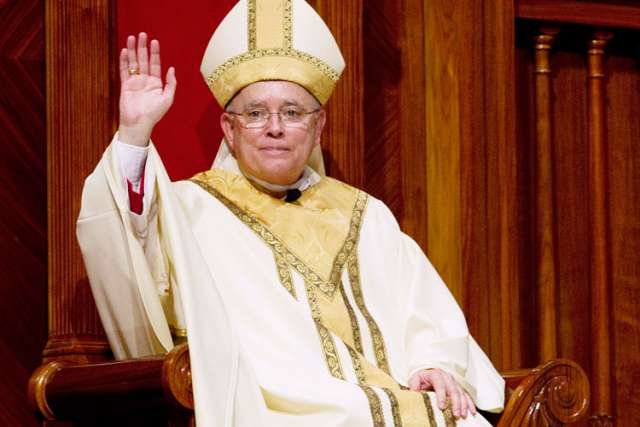Reaction to the ruling in the Catholic community was swift and strong. Archbishop Charles Chaput of Philadelphia in a statement called the decision by U.S. District Court Judge John Jones III to strike down Pennsylvania's Defense of Marriage Act "a mistake with long-term, negative consequences."
Gov. Tom Corbett has 30 days to file an appeal, which the archbishop said he hoped would happen. In the meantime, Pennsylvania officials began issuing marriage licences to same-sex couples.
A day earlier, a federal judge in Oregon repealed that state's constitutional marriage amendment defining marriage as between a man and a woman. The Oregon Catholic Conference called it "a travesty of justice that marriage, as the foundation of society, received no defense in the U.S. District Court."
Oregon officials prepared to issue marriage licences to same-sex couples, after the U.S. 9th Circuit Court of Appeals rejected a bid by the National Organization for Marriage to stay the ruling.
With Oregon, 18 states have legalized same-sex marriage. It also is legal in the District of Columbia. Other courts' decisions have been stayed, pending appeals. That includes Idaho, Utah, Oklahoma, Virginia, Texas and Michigan.
In Arkansas, the state Supreme Court May 16 stayed a May 9 state court judge's ruling that struck down a ban on same-sex marriage. Several marriage licences were issued in the intervening days. In Indiana, Ohio, Kentucky and Tennessee, federal judges have ruled that out-of-state marriages must be recognized in those states.
In Pennsylvania, Chaput said state laws that defend traditional marriage "were enacted for sound reasons — namely to defend the rights of children and contribute to the well-being of the larger community."
"Marriage is more than a private arrangement between two people," he said. "It's a public commitment of love and fidelity, and it's ordered not just to companionship but to creating and rearing new life. This is why every child deserves a mother and a father in a loving marriage, and the child is the fruit of that love.
"All men and women are formed in the image of God and deserve our respect. But attempts to redefine the nature of marriage, no matter how well-intentioned," he said, "damage a cornerstone of our human interaction and ultimately work against human dignity itself."
The Pennsylvania Catholic Conference, the public policy arm of the state's Catholic bishops, said the judge's ruling "speaks to the confusion and misunderstanding among many today about the fundamental building block of society: the family. Every child has a basic right to a mother and a father united in marriage as a family. Today's decision does not change that."
In its statement, the Catholic conference reiterated consistent Catholic teaching that all people are made in the image of God and that everyone has inherent dignity, adding that no one should face discrimination.
"But human experience, considerable social data, as well as our religious convictions, lead us to see clearly that children thrive best in a stable family grounded on the marital union of one man and one woman," it said.
"Catholic opposition to same-sex marriage is not a statement about the worth of human beings who experience same-sex attraction, but a statement about the nature of marriage itself."
The Catholic Church teaches that sex outside of marriage between one man and one woman is sinful.
In his 41-page opinion, Jones said Pennsylvania's laws that prohibit same-sex marriage and do not recognize the marriages of same-sex couples in other states violate the due process and equal protection clauses of the 14th Amendment to the U.S. Constitution "and are therefore unconstitutional."
In Oregon, Catholic leaders said they were grieved by U.S. District Court Judge Michael McShane's decision to repeal that's state's law upholding traditional marriage and by Attorney General Ellen Rosenblum's refusal to defend that law. Her decision was "an extreme dereliction of her sworn duty to uphold the law" and represent "the interests and the people of Oregon," said the Oregon Catholic Conference's statement. "It is a sad day for democracy when one federally appointed judge can overturn, without any representation, the express will of the people of Oregon."
In other developments concerning same -sex marriage, the Michigan Catholic Conference May 14 filed a friend-of-the court brief with the 6th U.S. Circuit Court of Appeals to defend a 2004 voter-approved amendment to the Michigan constitution that defines marriage as the union of one man and one woman. The state has appealed a lower court's ruling that found the Michigan Marriage Amendment unconstitutional.
In Indiana, a division of the University of Notre Dame's undergraduate student government denied recognition of a proposed campus group called Students for Child-Oriented Policy, aimed at advancing the Catholic Church's position on children and family and its support for traditional marriage. In an April 30 letter to the prospective club president released online by supporters of the proposed club, Margaret Hnastusko, the university's director of student activities for programming, said the mission of the proposed club "closely mirrored that of other undergraduate student clubs on campus."
The letter did not specify what existing clubs have the same mission, but said recognition of a new campus club rests on a number of factors including "uniqueness to campus."

